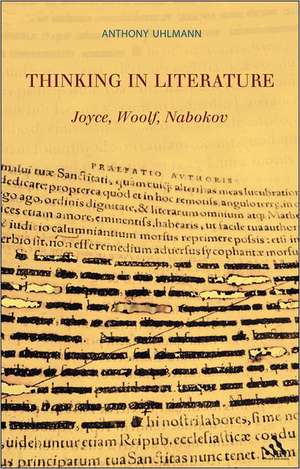Thinking in Literature: Joyce, Woolf, Nabokov
Autor Professor Anthony Uhlmannen Limba Engleză Hardback – 28 sep 2011
| Toate formatele și edițiile | Preț | Express |
|---|---|---|
| Paperback (1) | 189.18 lei 43-57 zile | |
| Bloomsbury Publishing – 28 sep 2011 | 189.18 lei 43-57 zile | |
| Hardback (1) | 711.67 lei 43-57 zile | |
| Bloomsbury Publishing – 28 sep 2011 | 711.67 lei 43-57 zile |
Preț: 711.67 lei
Preț vechi: 913.42 lei
-22% Nou
Puncte Express: 1068
Preț estimativ în valută:
136.18€ • 142.54$ • 113.34£
136.18€ • 142.54$ • 113.34£
Carte tipărită la comandă
Livrare economică 31 martie-14 aprilie
Preluare comenzi: 021 569.72.76
Specificații
ISBN-13: 9781441147820
ISBN-10: 1441147829
Pagini: 176
Ilustrații: 3 illus
Dimensiuni: 138 x 216 x 18 mm
Greutate: 0.32 kg
Ediția:New.
Editura: Bloomsbury Publishing
Colecția Continuum
Locul publicării:New York, United States
ISBN-10: 1441147829
Pagini: 176
Ilustrații: 3 illus
Dimensiuni: 138 x 216 x 18 mm
Greutate: 0.32 kg
Ediția:New.
Editura: Bloomsbury Publishing
Colecția Continuum
Locul publicării:New York, United States
Caracteristici
Offers new insights into elements of the aesthetic practice of three major Modernist writers.
Notă biografică
Anthony Uhlmann is Professor of English in the Writing and Society Research Group at the University of Western Sydney, Australia. He is the author of Beckett and Poststructuralism (Cambridge University Press, 1999), Samuel Beckett and the Philosophical Image (Cambridge University Press, 2006) and co-editor of The Ethics of Arnold Geulincx (Brill, 2006). He is chief editor of The Journal of Beckett Studies.
Cuprins
Introduction
Part 1: Literature and Thought
1. Spinoza and Relation
2. Leibniz's 'perception': the Incompossible, the Viewpoint, and the Composition of Sensation
3. Composition as the Externalised Expression of Sensation
Part 2: Thought in Modernist Fiction
4. James Joyce: the art of Relation
5. Virginia Woolf: the art of Sensation
6. Vladimir Nabokov: the art of Composition
Conclusion
Bibliography
Part 1: Literature and Thought
1. Spinoza and Relation
2. Leibniz's 'perception': the Incompossible, the Viewpoint, and the Composition of Sensation
3. Composition as the Externalised Expression of Sensation
Part 2: Thought in Modernist Fiction
4. James Joyce: the art of Relation
5. Virginia Woolf: the art of Sensation
6. Vladimir Nabokov: the art of Composition
Conclusion
Bibliography
Recenzii
"Anthony Uhlmann offers an impressively original and compelling series of interpretations that will substantially alter accepted ideas not only of Joyce, Woolf and Nabokov, but also of the epistemology and aesthetics of modernism. Uhlmann's Deleuzian approach-post-expressionist and post-representationalist-seeks to move beyond the traditional conception of modernism as an "inward turn" centered in subjectivity and interiority. Thinking in Literature accomplishes its highly innovative readings with subtlety, intelligence and insight." -- Richard Begam, Professor of English, University of Wisconsin-Madison, USA
"In this ambitious contribution to literary theory, Anthony Uhlmann shows how a work of literature can be said to think, and thus in what sense literature helps us to understand the world. On the way he provides exemplary analyses of Virginia Woolf and Vladimir Nabokov at work, as well as useful unfoldings of difficult material from Spinoza and Leibniz." -- J M Coetzee
His book enriches our understanding of the mental work that modernist fiction captures and elucidates.His study also refines one's understanding of how thinking reflects and distorts the real and how artistic work enables one to confront this experience at a remove.
At a time when the humanities are increasingly under attack, Uhlmann's slender volume about Thinking in Literature is a much-needed study, as it intelligently defines the value of literature and literary studies.Uhlmann's expanded but rigorous concept of thinking is an essential contribution to modernist studies in general and Woolf studies in particular, as it provides a clear pathway for going beyond those deconstructive approaches that strand authors and readers in the abyss of the textual gap. Uhlmann has established an excellent framework that will enable scholars to think in new and more rigorous ways about literature and educators to teach students how to use modernist literature to refine their capacity to think.
Thinking in Literature does represent a rare and robust attempt to reformulate the aesthetic and cognitive characteristics of modernism.
"In this ambitious contribution to literary theory, Anthony Uhlmann shows how a work of literature can be said to think, and thus in what sense literature helps us to understand the world. On the way he provides exemplary analyses of Virginia Woolf and Vladimir Nabokov at work, as well as useful unfoldings of difficult material from Spinoza and Leibniz." -- J M Coetzee
His book enriches our understanding of the mental work that modernist fiction captures and elucidates.His study also refines one's understanding of how thinking reflects and distorts the real and how artistic work enables one to confront this experience at a remove.
At a time when the humanities are increasingly under attack, Uhlmann's slender volume about Thinking in Literature is a much-needed study, as it intelligently defines the value of literature and literary studies.Uhlmann's expanded but rigorous concept of thinking is an essential contribution to modernist studies in general and Woolf studies in particular, as it provides a clear pathway for going beyond those deconstructive approaches that strand authors and readers in the abyss of the textual gap. Uhlmann has established an excellent framework that will enable scholars to think in new and more rigorous ways about literature and educators to teach students how to use modernist literature to refine their capacity to think.
Thinking in Literature does represent a rare and robust attempt to reformulate the aesthetic and cognitive characteristics of modernism.
